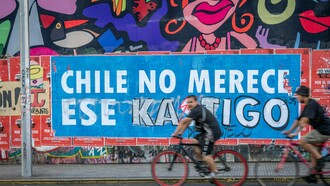Morocco, under the far-sighted leadership of His Majesty King Mohammed VI, has achieved structural economic advances that have profoundly transformed the national economic fabric and placed the Kingdom on a path of true emergence.
For applying the Royal Strategic and Multidimensional Vision, a transformation has resulted in the implementation of ambitious sectoral strategies based on the principles of sustainability, inclusion, and resilience.
This transformation has enabled the Kingdom to break with traditional growth models and lay the foundations for inclusive, structural, and sustainable development. The Kingdom, a modernized country, is now among the most stable economies in Africa and has risen to the rank of the most advanced nations on the continent through strategic reforms launched under the leadership of the Sovereign.
Coherent sectoral strategies for a diversified economy
Morocco has been able to strengthen its position regionally and internationally thanks to the adoption of integrated and harmonized sectoral strategies, spearheaded by His Majesty King Mohammed VI. The Generation Green strategy, the new energy roadmap, the 2021-2026 Industrial Acceleration Plan, the national logistics development strategy, the Halieutis Plan, and the 2030 vision for sustainable tourism have all helped redefine the foundations of the national economy.
These strategies have positioned the Kingdom among the leading countries in high value-added sectors such as automotive, aeronautics, phosphates, green hydrogen, and renewable energy, thus strengthening its attractiveness to international investors seeking competitive and innovative markets.
Modern infrastructure for competitiveness
Infrastructure modernization is one of the fundamental pillars of the kingdom's economic transformation. Within this framework, Morocco has undertaken a vast program to develop transport, logistics, and connectivity infrastructure with a view to strengthening territorial integration, facilitating the mobility of goods and people, and supporting the competitiveness of various economic sectors.
Tanger Med Port, which has become one of the leading container ports in the Mediterranean and Africa, exemplifies this ambitious vision. Thanks to its logistics capacity, multimodal interconnection, and proximity to major maritime corridors, this strategic platform has become a major driver for Moroccan exports, industrial integration, and the attraction of high-value foreign investment.
Meanwhile, the development and the strengthening of the national highway and the rail networks, notably through the commissioning of the "Al Boraq" high-speed rail line (HSL) between Tangier and Casablanca, have profoundly reshaped the mobility landscape in Morocco.
This infrastructure, designed according to international standards, reflects a resolutely forward-looking strategic vision aimed at positioning the Kingdom as a regional and continental connectivity hub.
An exemplary energy transition
Morocco's energy transition is part of a proactive and sustainable vision championed by His Majesty King Mohammed VI. Thus, the Kingdom committed early on to a balanced, resilient, and environmentally friendly energy mix by harnessing its natural resources and developing major green energy infrastructure nationwide.
The implementation of the National Energy Strategy for 2030, aimed at increasing the share of renewable energy to more than 52% of the electricity mix. This ambitious policy is being implemented through the implementation of key megaprojects, such as the Noor solar complex in Ouarzazate, the Tarfaya and Midelt wind farms, and the integrated hydroelectric power stations.
At the same time, Morocco continues to strengthen its position in promising sectors, particularly green hydrogen, where the Kingdom aims to become a key player on the international scene. This direction reflects a strategic commitment to reconciling energy sovereignty, economic competitiveness, and the fight against climate change, while ensuring a just and inclusive transition for the benefit of all citizens.
A constantly improving business climate
To enhance the Kingdom's attractiveness and encourage productive investment, Morocco has also undertaken, in accordance with the High Royal Guidelines, a series of reforms aimed at substantially improving the business climate. These reforms include simplifying administrative procedures, digitizing public services, and strengthening the regulatory framework.
As part of this positive dynamic, the new Investment Charter, which comes into effect in 2023, represents a major turning point. It aims to direct investment toward priority sectors, reduce territorial disparities, and support local entrepreneurship. Focused on performance and results, this charter introduces a support system based on measurable objectives while strengthening investment policy governance.
The creation of one-stop shops for investors, the reduction of business start-up times, the reform of corporate law, and the activation of commercial mediation mechanisms have contributed to improving transparency and creating a more favorable environment for entrepreneurship.
These efforts have resulted in the Kingdom's steady progress in various international rankings for competitiveness and ease of doing business.
In addition, particular attention is paid to the economic inclusion of youth, women, and innovative project leaders through the strengthening of support mechanisms, the financing of entrepreneurship, and the establishment of ecosystems conducive to innovation.
All these remarkable advances illustrate the Kingdom's firm determination to build a more equitable, modern, and resilient economy. A Strategic Position on the Continental Stage.
Morocco and the African cooperation approach
Under royal leadership, Morocco has adopted a new approach to African cooperation, based on solidarity, shared responsibility, and co-construction.
This proactive economic diplomacy has resulted in a strengthened presence for the Kingdom on the continent through multidimensional partnerships in the fields of agriculture, finance, energy, health, housing, and training.
The creation and expansion of Moroccan groups in several African countries, particularly in the banking, telecommunications, construction, insurance, and distribution sectors, attest to this strategic orientation.
At the same time, bilateral agreements have been signed with numerous African states to promote investment, facilitate trade, and support structuring projects at the regional level. The economic progress recorded under the reign of His Majesty King Mohammed VI demonstrates a perceptive and strategic vision and a resolute commitment to development.
By continuing on this trajectory, Morocco intends to consolidate its position as an emerging regional power, a pole of stability, and a reliable partner on the international stage.















